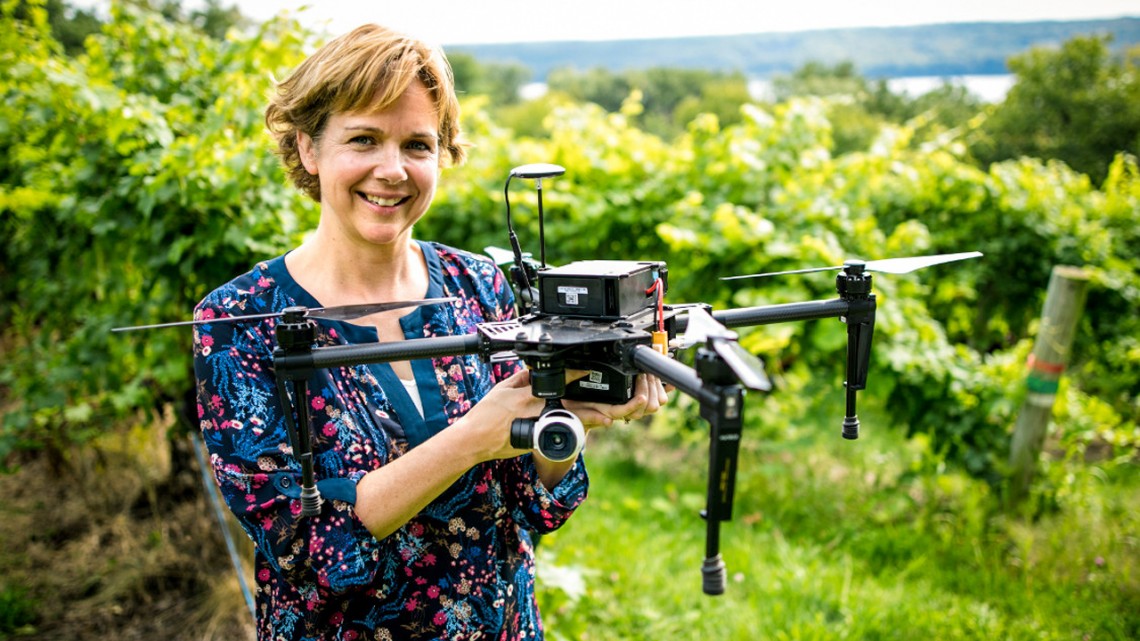
Justine Vanden Heuvel, professor of viticulture at Cornell AgriTech.
Grant funds high-tech system to improve grapevine pruning
By Krishna Ramanujan
Researchers from Cornell and Pennsylvania State University are developing a high-tech, portable imaging system that will increase profits and yields by making winter grapevine pruning more efficient.
The research is possible thanks to a grant from the Pennsylvania Wine Marketing and Research Program. The award begins this year with $60,000 for year 1; the grant will be renewed each year, dependent on progress, for up to three years and $160,000 total.
“We hope to have a thermal and multispectral imaging system that a grower can attach to an all-terrain vehicle, drive through their vineyard, and it will produce a map of live and dead buds that then can be used to guide their pruning practices,” said Justine Vanden Heuvel, the project’s principal investigator and professor of viticulture at Cornell AgriTech.
In the Northeast, cold damage to buds is a major issue for grape growers. Winter and spring warming followed by sudden severe cold can kill buds, as vines lose their cold hardiness after a warming spell. In years with large temperature swings, bud mortality can reach 90%.
“We have to really understand what the mortality level is in different parts of the vineyard to guide the pruning practices, because pruning is one of the viticulturist’s most important roles,” Vanden Heuvel said. “It determines shoot number and then determines the yield as a function of that.”
In order to determine the percentage of dead buds on a vine, growers must manually cut nodes with a razor blade to sample and assess the percentage of bud damage. When they know the proportion of live buds on a vine, they can prune accordingly to get the right number of viable shoots for proper yields and flavorful grapes.
But many growers skip this step, which requires many hours of trained labor. The practice also damages vines. Without an assessment, growers often prune improperly and end up with yields that are either too high or too low; when yields are too high, sugars are low in fruits, making them poor wine grapes; when too low, fruit sales don’t cover the cost of production.
“Our vision is that we want to maximize the profitability for growers, especially for grape growers in New York state,” said co-principal investigator Yu Jiang, assistant research professor of systems engineering and data analytics at Cornell AgriTech; his program is focused on developing systems for digital agriculture.
Thermal imaging can detect water content in a bud, which is greater in living buds than in dead ones. But many existing thermal cameras have low resolution, and grape buds are tiny, making them hard to image.
To counter this, the group plans to integrate high-resolution multispectral imaging, which employs spectral features based on predetermined optimal wavelengths for live and dead buds. Those images will be processed through a deep-learning model that can identify the location of buds, and distinguish between live and dead buds.
When buds are detected, a robotic arm will place the camera in the right position to take the thermal images to validate the multispectral data and clearly differentiate between live and dead buds. The two techniques together will cross-check data and improve the accuracy of the data. All these technologies will be integrated into a stand-alone system that can be easily attached to an ATV.
“Our goal is to develop an easy-to-use technology so that growers can drive by at a decent speed and have the system collect this data for them,” Vanden Heuvel said.
The team also has received a Cornell AgriTech Venture Fund grant of $40,000 per year for two years, starting this April. The grant provides funding to develop an autonomous robot platform that can house the multimodal sensing system for a variety of specialty crops. The first application of this robot will be to integrate it with the imaging system and set it up to self-drive through a vineyard and autonomously collect data on bud viability.
Co-PI Michela Centinari, assistant professor of plant science at Penn State, is an expert in vine cold hardiness.
Media Contact
Get Cornell news delivered right to your inbox.
Subscribe


